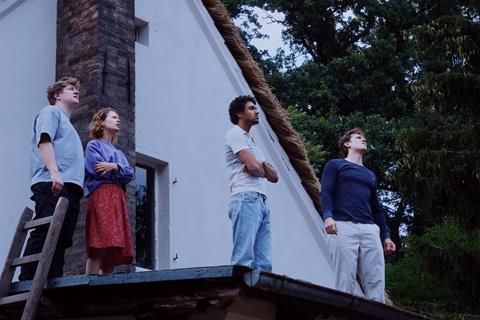Christian Petzold brings a wry comedy of manners to Berlin competition, moving the German director in an ‘entirely different direction’

Dir. Christian Petzold. Germany. 2023. 102mins
Christian Petzold’s latest film recognisably possesses the German writer-director’s familiar trademarks: playful narrative structure, a distinctive locale that’s virtually a character in its own right, the sense that there’s something else – a myth, or a subtext from cinema history – lying beneath the surface of the ostensible story. Even so, Afire takes Petzold in a distinctly new direction. While, on one level, it seems to belong to international cinema’s increasingly prevalent strain of climate catastrophe dramas, on another it’s a brittle character piece, a comedy of social embarrassment with a dark and ultimately tragic undertow. Until, that is, a coda ties it off in another register entirely.
There are many more laughs in Afire than a Petzold film has ever afforded
A superb lead performance by Thomas Schubert, together with a playful return from established star Paula Beer, from Petzold’s Transit and Undine, will add commercial heft to one of Petzold’s most accessible works, while festivals should pounce on the latest development in his sly auteur approach.
Less densely plot-driven than previous Petzold dramas, Afire follows the water-themed fable Undine with another elemental variation (the awkward English title is more overt than the original Roter Himmel, or ‘Red Sky’). The film begins with friends Leon (Schubert) and Felix (Langston Uibel) driving through a forest near Germany’s Baltic coast, only for their car to break to down. They are forced to walk, and Felix suggests a short cut through the trees, allowing Petzold to nudge at horror film conventions which suggest that he may intend to go Shyamalan on us – although in fact he has other plans entirely.
When the men arrive at a house in the woods belonging to Felix’s mother, we learn that they have come to work – Felix to prepare photos for an art project, and published writer Leon to complete a novel that is manifestly causing him intense angst. It turns out that someone is already staying at the house, a young woman named Nadja (Beer), who is barely glimpsed at first but whose loud love-making in the next room causes Felix sleepless nights.
Her lover, it turns out, is a muscular lifeguard (he prefers ‘rescue swimmer’) named Devid (Enno Trebs) – that’s Devid with an ‘e’, a ‘GDR quirk’, we’re told. When Devid comes to dinner, and tells a long, rambling story about a near-seduction and an unwelcome visitor, Leon’s nerves are set on edge – partly by Devid’s untrammeled machismo and partly, we imagine, because the newcomer has the easy narrative skills that uptight, high-literary Leon doesn’t. Things get worse when Leon’s editor Helmut (Matthias Brandt) arrives to work with him, but is distracted by the convivial company – leaving Leon altogether on the outside, and still quaking from an appraisal of his book from Nadja, whose literary nous he has carelessly underestimated.
There are many more laughs in Afire than a Petzold film has ever afforded, but of a wry, sophisticated sort in which the ironies of misunderstanding are beautifully orchestrated through looks, silences and subliminal cringes. An unexpected and very droll twist involving the house’s nocturnal racket paves the way to a final act – effective if undeniably contrived – in which the apocalyptic rumblings presaged earlier come to the fore.
The red sky of the forest fires glimpsed in the distance can be taken literally, but also functions as a metaphor for desire, the creative energy that eludes Leon and the psychological torment that threatens to engulf him. Of course Petzold knows exactly what he’s doing evoking all these Romantic clichés – and that of the Muse, which is inverted in the figure of Nadja, who is better at discouraging Leon than inspiring him.
Austrian actor Schubert – whose work includes 2011 film Atmen and German Netflix series King of Stonks – here resembles a cross between Jason Segel and a plus-size James Spader, and gives an affecting, sometimes quietly excruciating, often pricelessly funny depiction of tetchy self-absorption underwritten by helpless, neurotic desire. In other words, he makes Leon intensely sympathetic, even if he isn’t remotely likeable. Beer, less obviously a Woman of Mystery than in Undine, still makes Nadja an enigmatic figure, all the better to gradually unwrap her secrets. The other three offer relaxed, precisely calibrated support, with Trebs particularly effective in that show-stoppingly comic dinner-table narration.
Music by Tarwater, Ryuichi Sakamoto and Austrian group Wallners is woven into the action to discreet strategic effect, adding a further layer of class to a film that’s arguably lighter Petzold than usual, but still bears the unmistakeable stamp of his intellectual and conceptual elegance.
Production company: Schramm Film Koerner Weber Kaiser
International sales: The Match Factory sales@matchfactory.de
Producers: Florian Koerner von Gustorf, Michael Weber, Anton Kaiser
Screenplay: Christian Petzold
Cinematography: Hans Fromm
Production design: K.D. Gruber
Editor: Bettina Böhler
Music: Tarwater, Ryuichi Sakamoto, Wallners
Main cast: Thomas Schubert, Paula Beer, Langston Uibel, Enno Trebs, Matthias Brandt















![[L-R]: Amanda Villavieja, Laia Casanovas, Yasmina Praderas](https://d1nslcd7m2225b.cloudfront.net/Pictures/274x183/6/4/1/1471641_pxl_20251224_103354743_618426_crop.jpg)








